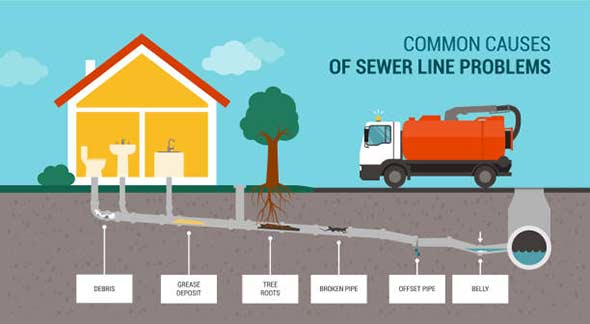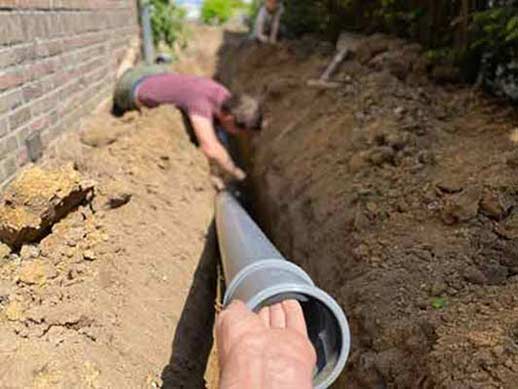Welcome to our guide on essential practices for a trouble-free sewer line maintenance. In this article, we will explore some key strategies and tips to keep your sewer lines running smoothly and prevent costly and inconvenient issues. Whether you are a homeowner or a professional in the plumbing industry, these practices will help you maintain the integrity of your sewer system and avoid potential problems in the future.
The Importance of Sewer Line Maintenance
Proper sewer line maintenance is crucial to ensure the efficient and safe operation of your plumbing system. Neglecting sewer line maintenance can lead to various issues including clogs, backups, leaks, or even complete system failure. These issues can result in costly repairs, damage to your property, and health hazards.
By implementing regular maintenance practices, you can identify potential problems early on, prevent major issues from occurring, and extend the lifespan of your sewer system. Additionally, a well-maintained sewer line contributes to a healthy environment by minimizing the risk of sewage leaks or contamination.
Understanding Your Sewer System
Before diving into the essential practices for sewer line maintenance, it is important to have a basic understanding of how your sewer system works. Sewer systems are responsible for transporting wastewater from your home or property to the municipal sewer lines or a septic tank. The main components of a sewer system include:
- Sewer Pipes: These pipes are responsible for carrying wastewater from your plumbing fixtures to the main sewer line.
- Main Sewer Line: The primary pipe that collects all the wastewater from various sewer pipes and transports it to the municipal sewer lines or septic tank.
- Cleanout: A access point to the sewer line that allows for easy inspection and cleaning.

Sewer systems are responsible for transporting wastewater from your home or property to the municipal sewer lines or a septic tank.
Essential Practices for Sewer Line Maintenance
1. Regular Inspections
Regular inspections are the foundation of effective sewer line maintenance. Inspecting your sewer system allows you to identify any potential issues before they turn into major problems. Consider scheduling professional inspections at least once a year, or more frequently if you have an older sewer system or are experiencing recurring issues.
During an inspection, a trained professional will use specialized equipment such as video cameras to inspect the interior of your sewer pipes. This allows them to identify any cracks, blockages, tree root intrusions, or other signs of damage. Based on the inspection results, appropriate measures can be taken to resolve the issues.
2. Proper Waste Disposal
One of the most common causes of sewer line issues is improper waste disposal. Avoid flushing or draining substances that can clog your pipes, such as grease, oil, cooking fats, coffee grounds, diapers, sanitary products, paper towels, or excessive amounts of toilet paper.
Dispose of these substances properly by placing them in designated waste containers or following local regulations for disposal. This simple practice can go a long way in preventing clogs and backups in your sewer system.
3. Tree Root Management
Oftentimes, tree roots can infiltrate sewer pipes, causing blockages and damage. It is important to manage the growth of trees near your sewer lines to minimize the risk of root intrusion.
If you have trees in close proximity to your sewer system, consider consulting with a professional arborist. They can provide guidance on appropriate tree selection, placement, and root barrier installation to prevent root-related sewer line issues.
4. Grease Trap Maintenance
If your property has a commercial kitchen or produces a significant amount of grease waste, it is essential to have a properly maintained grease trap. Grease traps capture grease, fats, and oils, preventing them from entering the sewer lines and causing blockages.
Regularly inspect and clean your grease trap to ensure it is functioning effectively. Consult with a professional to determine the appropriate maintenance schedule based on the size and usage of your grease trap.
5. Water Flow Management
Proper water flow management is crucial for maintaining a trouble-free sewer line. Avoid excessive water usage within a short period of time, as it can overload your sewer system and lead to backups.
Take care to spread out water usage throughout the day and avoid activities that create a sudden surge in water flow, such as washing multiple loads of laundry simultaneously. Additionally, ensure that your gutters and downspouts are directing water away from your sewer system to prevent excess water infiltration.
6. Regular Cleaning
Regular cleaning of your sewer system is essential for preventing clogs and maintaining optimal functionality. While professional cleaning is recommended, there are also preventive measures you can take on your own.
Using enzymatic drain cleaners or vinegar and baking soda solutions can help break down organic matter that accumulates in your pipes. However, it is important to avoid using harsh chemical drain cleaners, as they can cause damage to your sewer pipes.
7. Educating Residents
If you own a multi-unit property or manage a building with multiple occupants, educating residents about proper sewer line usage and maintenance practices is crucial. Provide clear guidelines on what should and should not be flushed or drained down the plumbing fixtures.
In addition, encourage residents to report any plumbing issues promptly to prevent minor problems from escalating into major ones. Regular communication and reminders can help promote responsible sewer usage and minimize potential issues.
8. Prompt Repairs
If you notice any signs of sewer line issues, such as slow drains, gurgling sounds, foul odors, or backups, it is important to promptly address them. Ignoring these warning signs can lead to more severe problems and costly repairs down the line.
Contact a professional plumber to assess the situation and provide the necessary sewer line repairs. Remember, early detection and intervention are key to maintaining a trouble-free sewer line.
In Closing
Maintaining your sewer lines should be a priority to ensure a trouble-free plumbing system. By implementing regular inspections, proper waste disposal practices, tree root management, grease trap maintenance, water flow management, regular cleaning, educating residents, and addressing repairs promptly, you can prevent major issues and extend the lifespan of your sewer system.
Remember that prevention is always better than dealing with costly repairs and inconvenience. Take the necessary steps to keep your sewer lines in optimal condition, and consult with professionals for expert advice and assistance when needed. With proper maintenance, you can enjoy a trouble-free sewer system for years to come.
